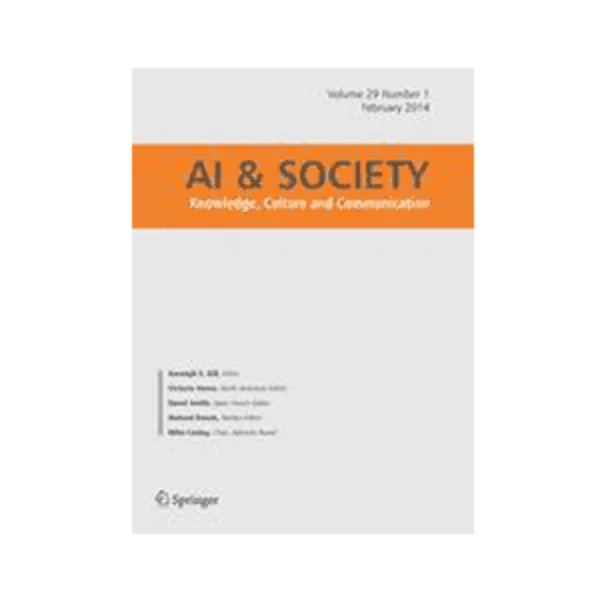-
an agent-based simulation for restricting exploitation in electronic societies through social mechanisms
جزئیات بیشتر مقاله- تاریخ ارائه: 1392/07/24
- تاریخ انتشار در تی پی بین: 1392/07/24
- تعداد بازدید: 896
- تعداد پرسش و پاسخ ها: 0
- شماره تماس دبیرخانه رویداد: -
one of the problems in artificial agent societies is the problem of non-cooperation, where individuals have motivations for not cooperating with others. an example of non-cooperation is the issue of freeriding, where some agents do not contribute to the welfare of the society but do consume valuable resources. new mechanisms for group self-organisation and management in multi-agent societies are presented and examined in a multi-agent societies where nodes of a p2p system are modelled as interacting agents belonging to different groups. the context of interaction between agents is the sharing of digital goods in electronic societies. we have simulated a decentralised p2p system which self-organises itself to avoid cooperative sharers being exploited by uncooperative free riders. specifically, we illustrate how cooperative sharers and uncooperative free riders can be placed in different groups of an electronic society in a decentralised manner. inspired by human society, we use social mechanisms such as tags, gossip and ostracism. our aim here is to restrict exploitation or in other words restrict uncooperative behaviour by separating groups based on performance since it reduces the likelihood of bad agents exploiting the good agents in the better groups. the developed system shows promising results by encouraging sharers to move to better groups and also by restricting free riders without any centralised control, which makes these mechanisms appropriate for distributed policy governance. our work offers new insights into policy mechanisms for regulation of distributed societies.
مقالات جدیدترین رویدادها
-
استفاده از تحلیل اهمیت-عملکرد در ارائه الگوی مدیریت خلاقیت سازمانی و ارائه راهکار جهت بهبود
-
بررسی تاثیر ارزش وجوه نقد مازاد بر ساختار سرمایه شرکت های پذیرفته شده در بورس اوراق بهادار تهران
-
بررسی تأثیر سطح افشای ریسک بر قرارداد بدهی شرکت های پذیرفته شده در بورس اوراق بهادار تهران
-
بررسی تأثیر رتبه بندی اعتباری مبتنی بر مدل امتیاز بازار نوظهور بر نقد شوندگی سهام با تأکید بر خصوصی سازی شرکت ها
-
تأثیر آمیخته بازاریابی پوشاک ایرانی بر تصویر ذهنی مشتری پوشاک ایرانی (هاکوپیان)
-
شناسایی ریسک نقدینگی شعب بانک ها با استفاده از روش swara مبتنی بر mabak
-
اثر عمق قرار گیری تونل های زیرزمینی در محیط های همگن بر رفتار دینامیکی سازه
-
experimental tests of slender reinforced concrete columns under combined axial load and lateral force
-
drop size distribution and mean drop size in a pulsed packed extraction column
-
heat transfer in inverted annular mode of steam-water flow
مقالات جدیدترین ژورنال ها
-
مدیریت و بررسی افسردگی دانش آموزان دختر مقطع متوسطه دوم در دروان کرونا در شهرستان دزفول
-
مدیریت و بررسی خرد سیاسی در اندیشه ی فردوسی در ادب ایران
-
واکاوی و مدیریت توصیفی قلمدان(جاکلیدی)ضریح در موزه آستان قدس رضوی
-
بررسی تاثیر خلاقیت، دانش و انگیزه کارکنان بر پیشنهادات نوآورانه کارکنان ( مورد مطالعه: هتل های 3 و 4 ستاره استان کرمان)
-
بررسی تاثیر کیفیت سیستم های اطلاعاتی بر تصمیم گیری موفق در شرکتهای تولیدی استان اصفهان (مورد مطالعه: مدیران شرکتهای تولیدی استان اصفهان)
-
بررسی اهمیت کلیدزنی در مزارع بادی و اعمال اضافه ولتاژهای مخرب بر آن و تامین استانداردهای مجاز
-
اثربخشی درمان شناختی رفتاری بر افزایش بهزیستی ذهنی معتادان
-
quantum chemistry calculations based on the density functional theory on diazinon pesticides
-
evaluation of shivering-related factors after general anesthesia in gynecological surgery
-
cost comparison of a building project by manual and bim




سوال خود را در مورد این مقاله مطرح نمایید :